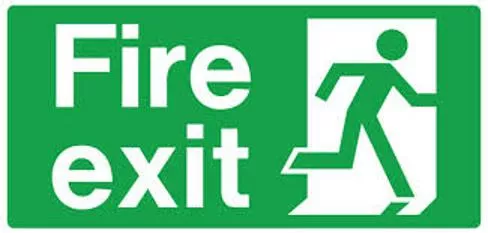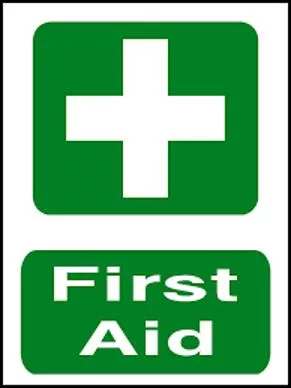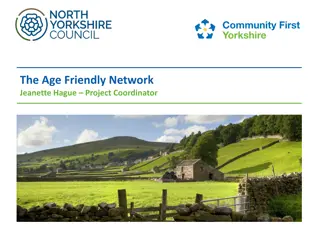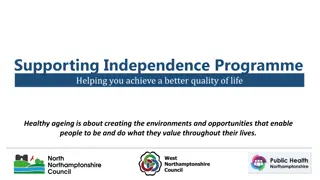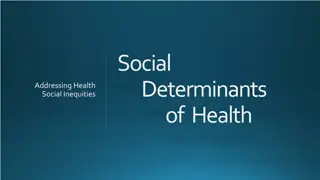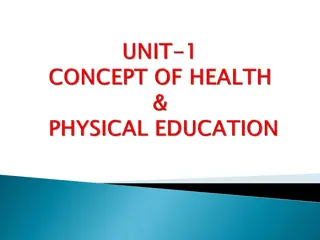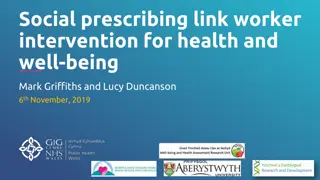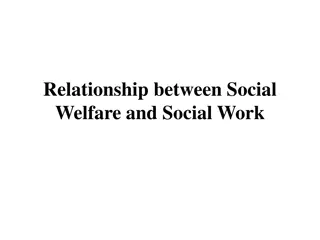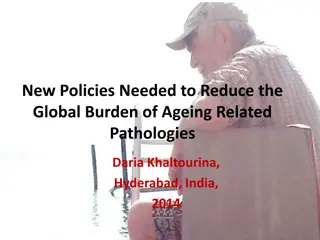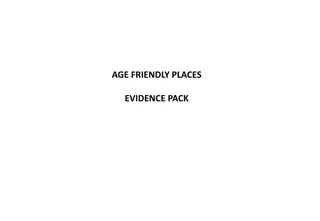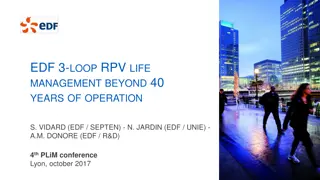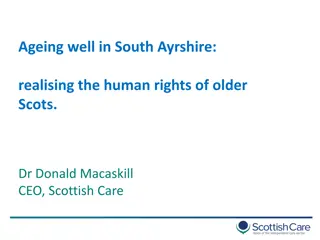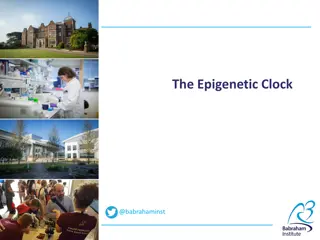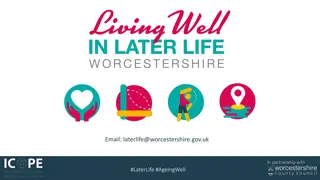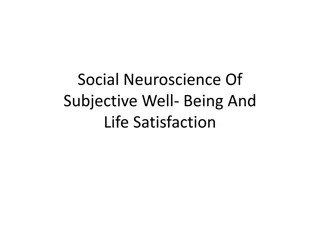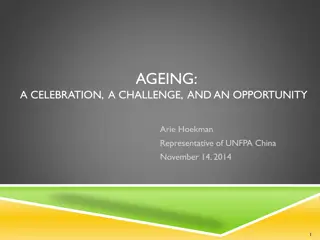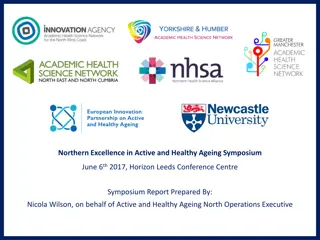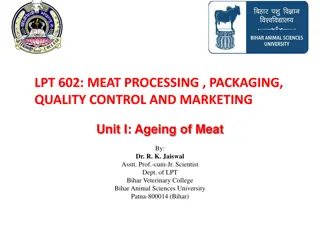Ageing and its Impact on Health and Social Well-being
Explore the physiological, social, and emotional aspects of ageing in healthcare. Learn about the ageing process, demographic changes, physiological effects, physical diseases, and social impacts on older individuals. Gain insights into the holistic needs of older people and the challenges they face in society. Discover the importance of providing appropriate health and social services to support the ageing population.
Download Presentation

Please find below an Image/Link to download the presentation.
The content on the website is provided AS IS for your information and personal use only. It may not be sold, licensed, or shared on other websites without obtaining consent from the author. Download presentation by click this link. If you encounter any issues during the download, it is possible that the publisher has removed the file from their server.
E N D
Presentation Transcript
Get in Touch! Like our Facebook page, and leave us a review! Follow us on Twitter @ HCTS_ie and tweet us anytime! Visit our website: Healthcaretrainingsolutions.ie Or you can e-mail us: info@hcts.ie
Care of the Older Person pwt ref:1908COP
Unit 1 - The Ageing Process Defining ageing process Where we live in the world Our environment Our lifestyle Social factors Inherited or genetic factors 4
Demographic Changes The ageing population Life expectancy greatly increased Incidence of: Disability, disease, mental illness Geographic Variations Physical environments Social and economics influences Behavioural Factors Access to appropriate, effective health and social services 5
Physiological Process of Ageing Hair loss Muscle mass Bones Digestive System Heart Lungs Reproductive Organs Temperature Control Senses Eyes and Ears Skin 6
Physical Diseases when Ageing Eyes Cataracts Glaucoma Mouth Gum disease Loss of teeth Oral health declines Skin Irritations Moles / Warts Varicose Veins Shingles 7
Physical Diseases when Ageing Bones and Joints Arthritis Osteoporosis Nervous System Hypothermia Multiple Sclerosis Parkinson s Disease Dementia Alzheimer's Depression Stroke - Blood clotting 8
Social impact of ageing Factors which can have a dramatic effect on the older person: Retirement Financial problems Increasing dependence can cause a loss of self respect Bereavement Feelings of isolation Physical decline 9
Different attitudes to ageing/ older people Greater demand on the care delivery / medical services. Holistic Needs; Physical Psychological Social Environmental Emotional Spiritual 10
Statutory and Voluntary Agencies promoting well being Statutory Agencies GPs Community Nursing Services Local Authority Dentists Physiotherapists Chemists Chiropodists Opticians Paramedics Hospitals Residential Care HSE 11
Voluntary Agencies Local Support Groups / Community Services Home Care Red Cross Meals on Wheels Private Agencies BUPA, PPP, VHI, VIVAS Private Providers: Private hospitals Orthodontists Physiotherapists Chiropodists 12
Preparation for Retirement Can be defined as the end of a working life Compulsory retirement aged 66 Retirement should be planned to address the following key areas: Pre-retirement courses Healthcare issues Financial provision Housing Social needs Leisure provision/social interests 13
The Older Person Retirement is difficult in any group You have a duty to uphold the rights of all clients in their care setting Everyone is entitled to the same level of care Respect them Treat them with dignity Help them to maintain their independence 14
Unit 2 - Working With the Older Person Holistic Needs: Physical Social Emotional Psychological Recreational Financial Environmental Spiritual. 15
Maslows Hierarchy of Human Needs 16
Activities of Daily Living Maintaining a safe environment Communicating Breathing Eating and drinking Elimination Personal Hygiene and dressing Controlling body temperature Mobilising Working and playing Sleeping Sexuality Dying 17
Physical Needs Ability to mobilise decreases, therefore ability to complete own personal hygiene is affected Can be very difficult to accept help physically Independence decreases Access to equipment needed for personal care Housing issues (bath/ shower accessibility) Dignity and Respect Skin care Continence Care 18
Social Needs Ability to form and maintain relationships Access to social situations If social needs are not met loneliness and isolation results 19
Emotional Needs Focuses on feelings of the individual Their ability to express, suppress Development of a personal identity Take responsibility for own actions Recognised emotions Laughter, happiness, anger, sadness, distress Older people are a vulnerable group Emotional needs are often neglected 20
Psychological Needs Mental well being: The ability to think clearly, problem solve, make rational decisions, perform particular processes to do with intellect The ability to express emotions, deal with stress, cope with other demands, on the mind social, physical, mental, emotional All needs are interlinked and can have an effect on each other 21
Recreational Needs Needs which promote mental activity / stimulation: Recreational activities Stimulate: Physical, mental, emotional well being N.B. Whilst there can be progressive deterioration in physical capabilities there should be a positive effort to promote recreational needs Activities should be suitable to client group i.e., age / skill appropriate, client involved Clients know best what they want 22
Financial Needs Older people may be dependent financially: If they are in a lower sociological group No pension provision Suffer from illness/disability If they live in isolation No means of transport Mental faculties are deteriorating Receive assistance when over 70 but may not meet needs 23
Financial Needs If a person cannot deal with their own affairs: Appropriate legal steps must be taken Assessment of mental ability carried out by GP Power of attorney given to: A relative, legal person, social service departments (under guardianship arrangements can deal with financial commitments) 24
Environmental Needs The surroundings in which we live includes: Noise, housing, social/physical context, noise, air, water quality Anything that affects peoples existence People should, where possible be cared for in own surroundings with family and community support With input from GP Community/District Nurse, Practice Nurse, family 25
Spiritual Needs Spiritual needs have to do with beliefs Carer s have a duty to facilitate all religious denominations Older people like to practice their religion How can the Spiritual needs be met N.B. People who are spiritually fulfilled are happy/contented/accepting 26
Nursing Home Environment Physical context Warmth, temperature, food, drinks, friendliness, atmosphere. Psychological needs Social needs Emotional needs Intellectual needs Invasion of personal space Often confuses people Isolation, loneliness even when surrounded by people 27
Role of Healthcare Assistant To assist the trained nurse to carry out planned care To report any unusual findings to the trained nurse To have an understanding of what needs to be reported / recorded To carry out basis Care of the Person duties Encourage independence in all aspects of care Assist clients to take part in social/recreational activities Orientate clients to time/place 28
Role of Healthcare Assistant Know how to communicate with clients. Convey empathy, sympathy, patience, cheerfulness. Know about confidentiality and how to observe it. Have enthusiasm for the job Be able to interpret body language/messages of vulnerable clients Be cheerful in the execution of tasks Never show disapproval when doing tasks that are difficult Be a good listener 29
Communication Communication is a two way process Sender message receiver Some clients may feel vulnerable Communication can be verbal, non-verbal Client s with vision difficulties Client s with speech difficulties Will involve assessing their problem Deciding on the method of communication Clients must be consulted on all aspects of their care Families should also be included in care 30
Communication Effective communication can be facilitated by showing sympathy, empathy to client, family, friends Be prepared to listen Use open body language be approachable Be friendly, smile, show a caring attitude Confidentiality do not abuse Refer to trained member of staff who can assist Carer s are not allowed to relay client details Be polite to members of the multi disciplinary team and assist wherever you can 31
Empowerment Empowerment means giving control to the client Enabling them to take control of: Their own lives Own decisions Choosing their own activities In cases where a client finds difficulty or lacks confidence then power can be shared between client and carer 32
Advocacy Advocacy means: Representing the interests of another, speaking on their behalf, presenting their case for them. Also means: Encouraging, enabling clients to speak up for themselves, to be assertive People who require advocates are usually vulnerable members of society e.g., older people, children, sick people, poorer members of society, ethnic minorities people with language or communication problems Encouragement of the client to self express is assisting with self advocacy and is a way of empowering 33
Independence The ability to do things for self without help or assistance from anyone else Being able to control own environment, lifestyles, choices, needs Being dependent may feel like a burden Carer s should be encouraged to do for the client s only what they cannot do for themselves in order to maintain independence Decision making should always involve client and family 34
Independence An assessment of needs is necessary: To find out what clients needs assistance with Discussion is important to best identify needs A skills assessment is necessary in case equipment is required Knowledge of previous lifestyle Will help identify client and aspirations. 35
Individualised Care Specifically designed for the particular client Involves the delivery of care using a holistic method; Physical, emotional, spiritual, social, intellectual etc. 12 Activities of Daily Living Safe Environment Communication Breathing and Circulation Eating and Drinking Washing and Cleaning Controlling Body Temperature - Elimination - Dying - Sleeping - Mobilisation - Expressing Sexuality - Working and Playing 36
Individualised Care Nurse: Select appropriate care needs of client Write a care plan for each client Sets realistic/achievable goals Plan a review date 3 / 6 months Updating of plan if some changes in condition or rewrite if total change/deterioration Both short/long term care plans to be used Filed properly Records kept for seven years All plans to be legal/dated/signed/upgraded 37
Dignity Processing self esteem, being worthy of respect, showing pride in achievement Dignity is a fragile concept and preserving it can be difficult Needs mutual respect between clients and carer Intimate tasks to be performed in a private setting Minimum number of people present Notice on door to ensure privacy/dignity Respect client feelings Use prompts, confidence boosters appropriately. Clients should be spoken to, not spoken of Lack of patience can lead to a loss of dignity 38
Choice As individuals we can make decisions about what we wear, how we live, socialise, the type of work we do, who to be with, where to go e.tc., gives us a sense of self respect / self worth As a carer you cannot belittle or disregard a client s wishes You should enable or facilitate client s where possible Facilitating choice means giving respect, being patient, preserving dignity 39
Constraints on Choice Loss of dignity may create vulnerability Carer s attitude should be one of encouragement Lack of time Lack of patience Criticism do not criticise client s choice Lack of assistance Not to have choice means that clients are controlled/disempowered Empowering is putting the ball back in the client s court Carer s are in a position of power they should not abuse it 40
Ways to Facilitate Choice Be flexible: Allow choice of menu Choice of clothing Choice of where to dine Choice of bedtime Giving time to express feelings Choice of entertainment Allowing client s to assist in formulating own care plan Promotion of the theory / practice of self advocacy 41
Respect and Dignity Dignity means being worthy of respect and possessing pride and self esteem Dignity and respect go hand in hand i.e., all people must be given respect in order that dignity needs are preserved Respect means treating each person as individual, tolerating point of view, allowing choice and facilitating choice where vulnerable clients are involved Giving respect to vulnerable clients means empowering them, creating and maintaining their independence It also means doing only for the client what they cannot do for themselves 42
Self Esteem Self esteem is a sense of who we are: People have ambitions A desire to be someone, to do certain things, have a set of values and achieve certain things Want to be unique and individual Increasing self esteem can lead to a boost in confidence and self worth Low self esteem leads to a lack of confidence resulting in depression and lack of confidence Good self esteem is important to encourage 43
Family/Carers as Partners in Care Client s should be consulted in every aspect of care Family can help to make logical decisions It helps family to think that they are still useful to their loved ones Help client feel loved Helps create independence Allows carer s to do other work We do not know best is something we need to remember 44
Carers Effectiveness Carer s need to have a Purpose/ Aim Job specific training Being a member of the unit/ team Responsibility Having sufficient staff to perform required tasks Staff relationships with each other Good communication Praise for care Suggestions Camaraderie 45
Issues that may affect carers Constraints Manipulative controlling behaviour Negativity Lack of confidence/loss of self confidence Poor staffing levels Lack of motivation Poor management Ineffective communication is unit/ team 46
Health Promotion for Older Clients Encourage health choices and contributes to: General well being Emotional well being Gives a feel good factor Identifies health related problems Improves body function Promotes exercise regimes/fitness Prolongs life 47
Health Promotion for Older Clients Healthy eating: Diet should consist of a balance of proteins, carbohydrates, dairy products, fruit and vegetables, oils/fats/sugars (small amounts) Alcohol consumption: Should be taken in moderation Exercise: It helps to improve joint function Smoking: Is harmful and should be discouraged 48
Therapeutic interventions Would improve/enhance social interactions Keeps mind/brain active and alert Creates a social existence Gives a sense of purpose/sets goals There are often constraints Difficulty in accessing therapists Transport facilities Mobility issues/ pain No one to accompany them Lack/loss of mental/intellectual skills Money constraints living on pension 49
Therapeutic interventions Day care Speech therapy Occupational therapy Physiotherapy Chiropody Preparation for retirement classes There are alternative medicines/therapies which can enhance conventional medicine (must be approved by GP/ Pharmacist first) 50









 undefined
undefined










